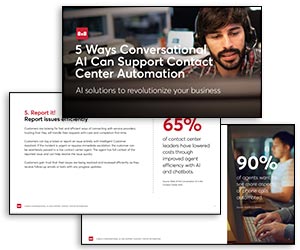Erica Marois at 8×8 shares her advice for fostering trust in your business relationships.
“Trust is built in the smallest moments.” – Dr. John Gottman.
As I was listening to an episode of Oprah’s SuperSoul Conversations podcast with Brené Brown, this quote struck me. I hit the pause button and quickly jotted it down in my red moleskin notebook.
For a while now, I’ve been planning to write a blog post about building trust. But so much generic advice has already been written about why trust is paramount to strong customer relationships, how it impacts the bottom line, and why it should be a guiding principle for any business.
What I don’t think we spend enough time thinking about is what it really means to build trust; or, on the flip side, what it takes to give trust.
How do we know we can trust a company with our business? How do we know we can trust a co-worker to have our back on a project?
As I pondered these questions, I turned to the authority on trust and vulnerability for answers – Brené Brown. And after listening to her 24-minute podcast episode, I felt ready to tackle this topic.
Spoiler alert – in many ways, it all comes down to openness. And building trust – while it takes effort – can open up a world of possibilities.
Let’s explore some of those! From what it takes to build trust, give trust, and destroy trust, to eight practical ways to put the science into action, this post will help you strengthen your professional relationships. Ready? Let’s begin!
The Science Behind Trust: What Does It Mean?
Dictionary.com defines trust as the “firm belief in the reliability, truth, ability, or strength of someone or something.” Common synonyms include confidence, belief, and faith.
In the same podcast that I mentioned earlier, Brené Brown shares a definition from Charles Feldman. In Feldman’s words: “Trust is choosing to make something important to you vulnerable to the actions of someone else.”
That sounds pretty risky. Especially if you think of this in terms of relationships with customers or work peers.
It’s one thing to make something important to you vulnerable to the actions of your spouse, your parent, your child, or your best friend. But to a business? A colleague? What are some ways to foster trust in those relationships?
In her book Dare to Lead, Brown offers up a seven-step framework for building trust. I highly recommend picking up a copy of the book, but if you’re tight on time, you can download a one-page summary of the seven elements of trust here. They are:
- Boundaries
- Reliability
- Accountability
- Vault
- Integrity
- Nonjudgement
- Generosity
By using even the smallest moments and actions as opportunities to respect others’ boundaries, stick to our promises, own up to our mistakes, protect others’ stories, do the right thing, give people the freedom to express themselves, and offer up acts of service without the expectation of anything in return, we prove ourselves trustworthy.
When we don’t do these things, we erode trust. And over time, we teach our customers or our co-workers that what’s important to them is not safe when left in our hands.
In a practical sense, what are some ways we can apply each of these elements to strengthen business relationships? Here are eight straightforward ways (bonus tip included).
8 Ways to Foster Trust in Your Business Relationships
1. Respect Your Co-workers’ and Customers’ Time Zones
The first of Brené Brown’s seven elements of trust is boundaries. One of the easiest but most powerful ways to respect other people’s boundaries is by respecting their time.
When you acknowledge that your peer’s life may be different from yours, you display emotional intelligence and you help them feel seen and respected.
Here’s a tiny example of this in action. I’m a remote employee based on the east coast. Not too long ago, one of my colleagues in California sent me a quick IM at around 5:06 ET.
“Sorry to bother you after 5:00, but if you’re still working, I have a quick question,” she said.
I was still working, and I certainly didn’t mind answering her question, but I was blown away by the fact that she was kind enough to remember I was in a different time zone, and then ask before adding another item to my list after “traditional” work hours.
It sounds like such a minor thing, but it totally made my day, and it also made me pause and think about the way I interact with my peers who live in other time zones.
I’m often an early bird, so I tend to fire off early-morning emails without paying attention to the clock. But ever since I received that IM, I’ve tried to be more mindful not to send messages to my west coast team until later in the morning.
Why? I want to respect their boundaries and give them the space to go to the gym, have breakfast with their families, or do anything other than feeling the need to respond to me during their personal time.
In a practical sense, here’s an easy way to make this happen, without letting things fall through the cracks.
Use the scheduling function in your email.
Need to remind a colleague of something you forgot to mention during that meeting today? Want to send a follow-up message after a customer meeting?
Schedule the message to arrive in their inbox during business hours in their time zone. Not only will that communicate that you’re a person who respects boundaries, but they’ll also be more likely to give your message their full attention.
2. Delegate and Ask for Help When You Need to – Don’t Try to Be a Superhero
We all have the best intentions when we’re serving customers or working alongside peers on essential projects. Most of us genuinely want to succeed, and many of us are people pleasers.
But sometimes the best of intentions can lead us astray. As a recovering people pleaser, I know all too well the (self-imposed) pressure to say “yes” to everything.
But as I’ve learned from my friend Jenny Dempsey, learning to say “no” sometimes gives us the freedom to say “yes” to other more important things. Saying no to our customers, our boss, or co-workers can actually be a gift to them and ourselves.
Perhaps you’re wondering, how so? Think in terms of the long-term impact saying “no” can have on a relationship.
Remember Brown’s second element of trust? It’s reliability. Aka doing what you say you’ll do.
When you blindly say “yes” to all the things, you run several risks.
- You run the risk of burning out. There are only so many hours in the day, after all.
- You run the risk of dropping the ball (see earlier point about the hours in a day).
- Ultimately, you run the risk of letting people down, by demonstrating that you can’t keep your promises.
It’s pretty simple. Promising to do something you don’t have time to do sets you up for failure, and puts you in a situation to let someone else down, whether that be a co-worker, a customer, a boss, or an employee.
The simple fix? Start being honest with yourself about what your schedule permits, and if you don’t have time to commit to doing something, ask for help. It takes practice, but when you’re honest about your own limits, you gain respect and establish trust and credibility.
3. Learn How to Apologize Like You Mean It
This tip goes hand in hand with Brown’s third element of trust: accountability.
Stop making excuses or pointing fingers. When you mess up – whether you’ve let down a customer or your boss – own your mistake, say you’re sorry, learn from it, and then move on.
This bit of advice is easier said than done for many people. Apologizing can sometimes feel awkward. How do you strike the right tone and make sure your apology feels genuine and helps to restore trust?
4. Choose to Be Above the Gossip
This one isn’t easy. We live in a world that thrives on 24/7 gossip and outrageous headlines. But work isn’t a reality TV show, so it’s best to save the scandal and the drama for your next Netflix and wine night.
According to Brown, one of the most critical elements of trust is not sharing secrets that aren’t yours to share. In the workplace, that might mean walking away from the gossip about a co-worker’s personal life, or choosing to change the subject when you hear a colleague make disparaging remarks about a customer.
If you want to establish yourself as trustworthy, you have to be above the gossip. Don’t share what isn’t yours to share. Remove yourself from toxic conversations or interactions that tear others down rather than build them up.
Try this. The next time you hear someone venting about that “annoying customer”, change the subject and find a way to put a positive spin on the situation.
As people see that you’re the type of colleague who has a bias towards positivity, you’ll reinforce that you’re someone others can trust. And as you change the narrative about customers in internal conversations, that sentiment will naturally have an impact on those around you, and your customers will sense it and appreciate it.
5. Align Your Performance Metrics With Values, not Just Profits
It seems impossible to have a conversation about trust without mentioning integrity. According to Brown, it is, indeed, a key element of trust. Essentially, integrity is all about living your values, not just professing them. This is an area in which plenty of businesses could stand to improve.
It’s nice to have corporate values around customer-centricity, honesty, or respect. It’s another thing entirely to enforce those values. So often business leaders fail to pay more than lip service to their guiding principles.
Whether inadvertently or purposely, employee performance metrics don’t always align with values. More often than not, they’re in competition with those values.
The result? You’re telling your customers one thing and showing them something different.
Leaders, if you want customers to trust your brand, you must make sure that your key performance indicators (KPIs) are about more than just profits.
Find ways to align your KPIs to your corporate values, to reward the employees who uphold those values, and to correct course when you discover processes or policies that detract from those values.
People managers, you can do your part by having regular conversations about your team and corporate values during meetings. Acknowledge the employees who are living your values. Share those examples far and wide and reward them.
6. Encourage Open Dialogue at Work – Your Customers Will Feel It, Too
If you know anything at all about Brené Brown, you know that she’s big on vulnerability. According to her research, you can’t have trust without it. The problem? For decades, we’ve been taught not to be vulnerable at work.
We’ve heard advice like “leave your baggage at the door” or “don’t let them see you sweat.” But in masking our true selves, we make it hard to build relationships meaningful enough to foster any sense of trust.
If you want to foster a work environment where co-workers trust one another and customers trust your employees to handle their business needs with care, you have to make it safe for people to bring their humanity to work.
We have to stop judging one another and start encouraging open dialogue.
Our lives aren’t compartmentalized. Our duties as mom, husband, or friend don’t end just because we step foot into the office. And likewise, our responsibilities as marketing director, IT support analyst, or recruiter very seldom end when we walk out of the office.
It’s time to start having open conversations about the joys and struggles of humanity. To begin seeing co-workers and customers as humans, too, rather than just job titles or steps in a project.
By designing work cultures that are more open (and I don’t just mean open-concept office floorplans), that openness gets extended to customers, helping to build trust and loyalty.
7. Regularly Practise Random Acts of Kindness
It’s probably no surprise that science suggests it’s easier to trust kind people. The last of Brown’s seven elements of trust is generosity. She has found that it’s human nature to believe people who give of their time, help, or resources freely, without expecting anything in return.
We all know people like this. The one friend you can always turn to for a favour. The co-worker who goes out of their way to make life just a little bit easier for those around them.
How can you establish yourself as a person of generosity? Start by making random acts of kindness a regular part of your work life. It might be a lot easier than you think. Here are a few examples:
- Waive a late fee for a customer, without them asking. Just because.
- Offer to sit in on a meeting and take notes for a co-worker so they can leave early.
- Offer to pick up lunch for the team on a day that’s busy.
- Send a handwritten thank-you note to a customer.
- Leave a $5 Starbucks gift card on a random windshield in the work parking garage.
- Volunteer to relieve a colleague of kitchen duty for the week.
- Make it a point to compliment at least one co-worker or customer each day.
The possibilities are endless. The payoff is enormous.
8. (Bonus) Pay Attention to the Small Details
In addition to Brené Brown’s seven elements of trust, here’s a bonus tip. The minor details matter. Brown would agree. In her podcast on trust, she mentions how all the small moments add up.
If you want people to trust you, you have to listen to them. Be observant. And take action to acknowledge them. Here are a few examples of this in action:
- Keep a note of birthdays – for employees and customers. Take a moment to send them a card, an IM, or an email on their birthday.
- Did a co-worker mention their kid is sick? IM them in a couple of days to ask how they’re feeling.
- Does one of your vendors play recreational softball? At the beginning of your next email or meeting, ask how their team’s season is going.
None of these actions may seem monumental to you, but they’ll likely make a world of difference for the recipient. And according to Dr. John Gottman, they will build on the foundation of trust.
Bringing It All Together
“To be trusted is a greater compliment than being loved.” ― George MacDonald
Building trust requires hard work, but it’s a worthy effort. Being a business and a person of integrity, generosity, and respect is the right thing to do, but, as it turns out, it also impacts the bottom line. Some would even argue that trust is the new business imperative.
By following Brené Brown’s lead and using the research-backed advice in this post, you’ll be well on your way to establishing yourself as trustworthy.
Author: Robyn Coppell
Published On: 6th Aug 2020 - Last modified: 11th Aug 2020
Read more about - Guest Blogs, 8x8
















